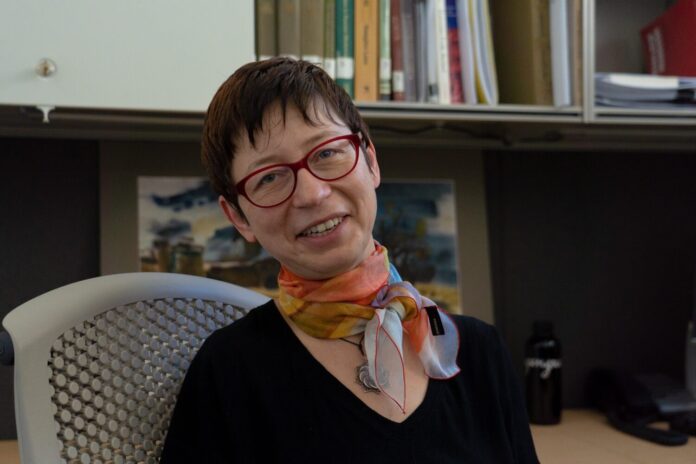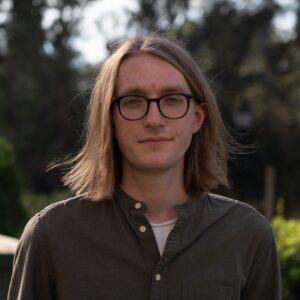
Russian forces entered Ukraine Feb. 24, escalating armed conflict in the region into what has been recognized on the global stage as a full-scale invasion. Within the Occidental community, professors and students shared their reactions, experiences and expertise.
The college hosted a discussion titled “Ukraine at War” March 1 to address the situation in Ukraine. The panel featured Derek Shearer, former U.S. Ambassador to Finland; Igor Logvinenko, professor of Diplomacy & World Affairs (DWA); Julia Sushytska, professor of Comparative Studies in Literature & Culture (CSLC); Victoria Umanskaya, professor of economics; and Phillip M. Ayoub, professor of DWA.
During the talk, Sushytska, who is from Ukraine, spoke about what she feels it means to be Ukrainian. Sushytska said her country’s identity is not tied to one particular ethnicity or language, but is heterogeneous.
“It’s not a kind of identity that is solid and trying to preserve its purity or anything like that. It’s really about freedom,” Sushytska said. “What’s happening there, what’s really at stake is freedom and not some sort of nationalism on the side of Ukraine.”
Globally, sanctions have been imposed by a 27-nation coalition to deter Russian aggression and pressure the country to end the invasion. Sushytska said sanctions are ineffective in the short term, as their effects will span a longer timeline but they fail to serve as a deterrent to current aggression.
“What the West — especially the European Union, the United States — what they’re doing is not nearly what they should be doing,” Sushytska said. “It’s insufficient. And even if in the long term these sanctions, the current sanctions, will have an effect, and even if this long term is not years — let’s say just months — that still means months of war crimes because that’s what is happening now.”
Sushytska said not taking an action itself is an action, and she said she believes the U.S. and European Union’s inaction will have consequences.
Nastasya Stasiv (sophomore) is a first-generation Ukrainian American living in the U.S. with her parents.
“When I saw the news that Kyiv was being bombed, I was shocked and felt very worried for family there, and how my parents would hold up,” Stasiv said. “The feeling of dread continues for me weeks later. I have no idea what it’s like to have your livelihood ripped away from you instantaneously, nor what it’s like to flee your home to seek refuge somewhere else.”
According to Stasiv, Ukraine has withstood Russia’s attempts to suppress their language and culture, and its people have held on to their identities.
“My parents identify with Ukraine and its values of democracy and individualism,” Stasiv said. “They carried their values of hard work and gratitude to me: gratitude for the freedoms I have [which I wouldn’t have been able to have in Russia].”
In Russia, Putin has signed a bill dictating a prison sentence of 5–15 years for violating censorship demands. Umanskaya, who is from Russia, said this censorship extends to the use of specific words and phrases in describing the situation in Ukraine.
“Right now, you cannot say the word ‘war,'” Umanskaya said. “So, if you say, ‘no to war,’ you can be arrested for that, because as far as the Russian government is concerned, there is no war going on.”
Umanskaya said, the situation in Ukraine has been devastating. Umanskaya attended a protest in Santa Monica and said though it wouldn’t alter current events, it felt important to be around like-minded individuals.
Community members from other regions in Eastern Europe have felt the impact of the invasion as well. Edin Custo (junior) is from Bosnia and Herzegovina, a region previously devastated by the events of the Bosnian War, which took place from 1992 to 1995.

According to Custo, the invasion of Ukraine is reminiscent of the events of the Bosnian War and the effect it has carried through generations.
“It’s definitely very concerning, especially given the fact that I come from Bosnia, which has gone through the war, some 20 years ago,” Custo said. “It just feels like a replay of so many different things for people in Ukraine now, and it’s very concerning that so many people are going to be stuck with a lot of generational trauma for years to come.”
Custo said he is currently worried for Bosnia and Herzegovina as well.
“The border of Bosnia is 400 miles away from the border of Ukraine, which is two countries away, but still very concerning,” Custo said.
In an effort to continue the discourse and provide more information on Ukraine, Occidental screened “The Lost Letter,” a Ukranian musical-tragicomedy, on March 19. A public lecture discussion titled “Ukraine: What is at Stake?” will take place every Thursday, 1–2 p.m. in Choi Auditorium.
“Ukraine fights for sovereignty, the sovereignty that allowed my parents to start new lives in the U.S. and allows me to speak freely about this issue and feel connected to Ukraine,” Stasiv said. “Being Ukrainian means being strong and resilient, and not a pawn piece.”
This article was edited Monday March 28 at 9:36 p.m. to correct Bosnia and Herzegovina’s official name, as corrected from “the republic of Bosnia and Herzegovina.”
![]()






























